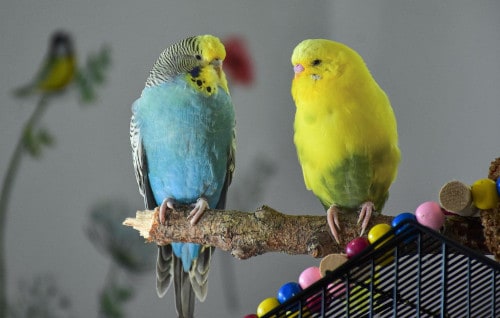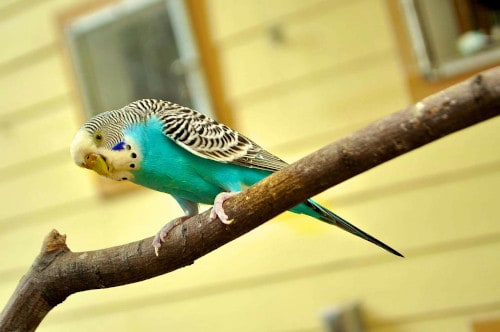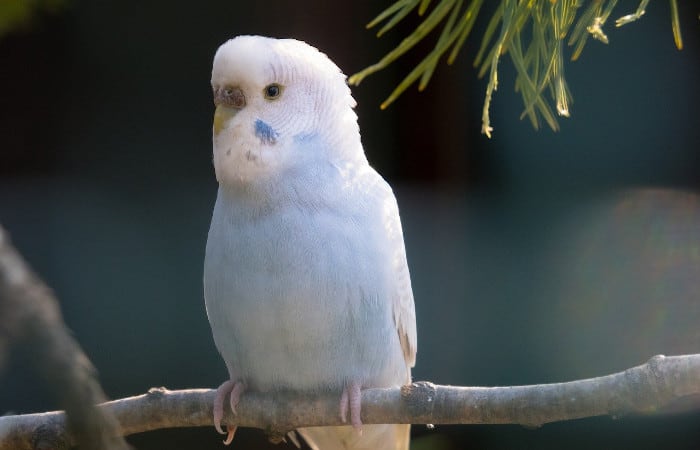Do you have a parakeet? If so, you probably know that they are well-known for their chirping.
But did you ever wonder why do parakeets chirp constantly?
In this blog post, we will discuss the reasons why parakeets chirp and what it means for their behavior.
We will also provide some tips on how to interpret your bird’s chirps and what they may be trying to tell you.
Why do parakeets chirp constantly?
Parakeets are vocal creatures that love to chatter away, but why do they do it?
There are a few reasons why parakeets chirp constantly. One reason is that they are trying to communicate with you.
Just like you would use words to tell your friends how you’re feeling, parakeets use chirping to let you know what’s on their minds.
They might chirp when they’re happy, scared, or even when they’re trying to get your attention.
Another reason parakeets chirp is that they are simply expressing themselves.
Parakeets are social creatures, and chirping is one way they stay connected to their flock.
In the wild, parakeets use chirping as a way to warn others of danger or to attract a mate.
Whatever the reason, it’s clear that parakeets have a lot to say – and they’re not afraid to let you know it.
You may also like: Do Parrots Build Nests?
What does it mean when parakeets chirp?

Parakeets are known for their cheerful disposition and colorful plumage, but did you know that these little birds are also excellent communicators?
Their chirps, squawks, and whistles can convey a wide range of emotions, from happiness to frustration.
Happy chirps
Happy chirps are typically used as a way to greet others or express excitement. If you hear your parakeet singing or chatting away, it’s likely feeling content and reassured of its place in the flock.
Unhappy chirps
On the other hand, unhappy chirps tend to be shorter and sharper in tone and may be used when the bird feels threatened or is experiencing pain.
Squawking
In addition to conveying emotions, parakeets also use their chirps and squawks to communicate specific needs or requests.
For example, a hungry bird may beg for food with a series of soft chattering noises, while a parakeet who wants to come out of its cage may repeatedly whistle for attention.
Singing
Some parakeets may sing for the sheer joy of it.
Birdsong is thought to be linked to mate selection in the wild, but captive parakeets often serenade their owners out of affection.
Communicating
Parakeets are very social creatures, and they use chirping to communicate with their flock mates.
When they chirp, they are essentially having a conversation.
The tone and pitch of their chirps will vary depending on what they are trying to say.
For example, a parakeet might make a high-pitched chirp when it is exciting, or a low-pitched chirp when it is feeling threatened.
In addition to conveying emotion, parakeets also use chirping to keep track of their flock mates. By listening to the chirps, they can determine the location and movements of their fellow birds.
Beak grinding
Finally, parakeets will also sometimes make a harsh, grinding noise with their beaks.
This usually indicates that they are unhappy or uncomfortable.
If your parakeet is making this noise, it’s important to take a closer look at its environment to see if there is anything that might be causing it distress.
By understanding the different types of chirping, you can better communicate and bond with your parakeet.
You may also like: Are Mirrors Bad For Parrots?
Tips for interpreting your bird’s chirps
Now that you know some of the reasons why parakeets chirp, you’re probably wondering how you can interpret your bird’s chirps.
Here are a few tips:
Observe your parakeet’s body language. The way your bird is standing or moving can give you clues about its emotional state.
Pay attention to the tone of the chirp. Is it high-pitched or low-pitched?
Listen to the rhythm of the chirps. Is your parakeet chirping rapidly or slowly?
Try to mimic your parakeet’s chirps. By imitating the sounds your bird is making, you can let it know that you’re trying to communicate.
Watch for changes in your parakeet’s chirping behavior. If you notice that your bird’s chirps are getting louder or more frequent, it may be trying to tell you something.
By taking the time to listen to your parakeet’s chirps, you can get a better sense of its emotions and needs. In turn, this will help you create a stronger bond with your feathered friend.
You may also like: Why Do Parrots Dance? (Can You Train Your Parrots To Dance?)
Why do parakeets chirp all night?

Many people enjoy the sound of birds singing, but there are times when the constant chirping can be frustrating, especially if it’s keeping you awake at night.
So why do parakeets chirp all night?
One possibility is that they’re trying to mate.
In the wild, parakeets are active during the day, so nighttime chirping may be an attempt to attract a mate.
Another possibility is that they’re mimicking the sounds of other birds.
Parakeets are social creatures and they may be trying to communicate with other birds in their flock.
Finally, it could simply be that they’re bored or restless.
If your parakeet is chirping all night, try providing them with more toys or perches to keep them occupied.
You might also try moving their cage to a different location in your home.
By experimenting a bit, you should be able to reduce the amount of nighttime chirping and get a good night’s sleep.
Why do parakeets chirp so loud?
Parakeets are known for their cheerful chirping, which can often be heard even through closed windows. But why do these small birds make such a big noise?
Parakeets chirp loudly because they are getting excited about something.
One reason is that parakeets chirp loudly to let other birds know where they are.
In the wild, parakeets live in flocks and travel vast distances in search of food.
By chirping loudly, they can keep in touch with other members of their flock and let them know when it’s time to move on.
Another possibility is that parakeets chirp to express their emotions.
When they’re happy, they may chirp louder and more frequently.
Conversely, when they’re feeling stressed or anxious, their chirping may be subdued.
Either way, it’s clear that parakeets use their voices to communicate with both their fellow birds and their human companions.
What are the types of parakeet sounds and what do they mean?
Parakeets are known for their vibrant plumage and cheerful twittering, but did you know that these lively little birds can also make a variety of other sounds?
In addition to their signature chirp, parakeets can produce a wide range of vocalizations, each with its own meaning.
For example, a cheerful warble often indicates that a parakeet is content and happy, while a harsh screech may signal fear or aggression.
Parakeets also use body language to communicate, and certain postures and gestures can convey important information about a bird’s mood and intentions.
By learning to interpret the different types of parakeet sounds, you can get to know your feathered friend in a whole new way.
How do you stop parakeets from chirping?
One of the most common complaints about parakeets is their incessant chirping.
While some people find the sound to be soothing, others find it to be annoying.
If you’re looking for ways to reduce the amount of noise your parakeet makes, there are a few things you can try.
One strategy is to provide your parakeet with more toys and activities.
A bored bird is more likely to chirp than a bird that is stimulated.
Try offering your parakeet new toys, perches, and branches to chew on.
You can also try training your parakeet to perform tricks or dance to music.
Another way to reduce chirping is to make sure your parakeet has enough food and water.
A hungry bird will often chirp in an effort to get attention.
Finally, if all else fails, you can try covering your parakeet’s cage at night.
This will create a dark environment that is conducive to sleep, and it may help your bird to chirp less during the day.
Conclusion
Parakeets are known for their cheerful chirping, which can often be heard even through closed windows.
But why do these small birds make such a big noise?
There are several reasons that parakeets chirp loudly.
However, it’s clear that parakeets use their voices to communicate with both their fellow birds and their human companions.
If you’re looking for ways to reduce the amount of noise your parakeet makes, follow the tips as suggested in this post.
